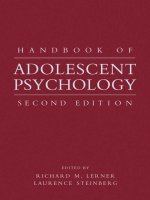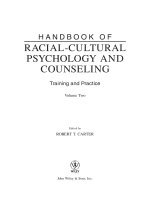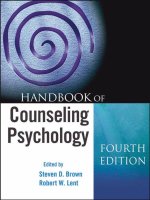HANDBOOK OF EXPERIMENTAL EXISTENTIAL PSYCHOLOGY pot
Bạn đang xem bản rút gọn của tài liệu. Xem và tải ngay bản đầy đủ của tài liệu tại đây (4.12 MB, 553 trang )
HANDBOOK OF EXPERIMENTAL
EXISTENTIAL PSYCHOLOGY
This page intentionally left blank
Handbook of
Experimental Existential
Psychology
Edited by
J
EFF GREENBERG
SANDER L. KOOLE
TOM PYSZCZYNSKI
THE GUILFORD PRESS
NEW YORK LONDON
© 2004 The Guilford Press
A Division of Guilford Publications, Inc.
72 Spring Street, New York, NY 10012
www.guilford.com
All rights reserved
No part of this book may be reproduced, translated, stored in a retrieval
system, or transmitted, in any form or by any means, electronic, mechanical,
photocopying, microfilming, recording, or otherwise, without written permission
from the Publisher.
Lyrics from “Roadhouse Blues”
Words and Music by The Doors
Copyright © 1970 Doors Music Co.
Copyright renewed
All rights reserved Used by permission
Printed in the United States of America
This book is printed on acid-free paper.
Last digit is print number: 987654321
Library of Congress Cataloging-in-Publication Data
Handbook of experimental existential psychology / edited by Jeff Greenberg,
Sander L. Koole, Tom Pyszczynski.
p. cm.
Includes bibliographical references and index.
ISBN 1-59385-040-9 (hardcover : alk. paper)
1. Existential psychology. 2. Psychology, Experimental. I. Greenberg,
Jeff, 1954– II. Koole, Sander Leon, 1971– III. Pyszczynski, Thomas A., 1954–
BF204.5.H34 2004
150.19′2—dc22
2004007991
In memory of our esteemed colleague Victor Florian,
a paragon of courage both as a pioneer
of experimental existential psychology
and as a human being
About the Editors
Jeff Greenberg is Professor of Psychology at the University of Arizona and associate editor
of the Journal of Personality and Social Psychology. He received his PhD from the Univer
-
sity of Kansas in 1982. Dr. Greenberg has published many articles and chapters, focused pri-
marily on understanding self-esteem, prejudice, and depression. In collaboration with Tom
Pyszczynski and Sheldon Solomon, he developed terror management theory, a broad theo-
retical framework that explores the role of existential fears in diverse aspects of human be-
havior. He is coauthor of the books Hanging on and Letting Go: Understanding the Onset,
Progression, and Remission of Depression (1992) and In the Wake of 9/11: The Psychology
of Terror (2003) and coeditor of Motivational Analyses of Social Behavior (2004).
Sander L. Koole is Associate Professor of Psychology at the Free University in Amsterdam.
He received his PhD in social psychology from the University of Nijmegen in 2000. Dr.
Koole has published articles and chapters on self-affirmation, implicit self-esteem, terror
management processes, and affect regulation. In collaboration with Julius Kuhl and other
colleagues, his recent work has focused on personality systems interactions theory, an inte
-
grative perspective that seeks to understand the functional mechanisms that underlie human
motivation and personality processes. Together with Constantine Sedikides, he was guest
editor of a special issue of Social Cognition on The Art and Science of Self-Defense (2004).
Tom Pyszczynski is Professor of Psychology at the University of Colorado at Colorado
Springs. He received his PhD in social psychology from the University of Kansas in 1980. In
collaboration with Jeff Greenberg and Sheldon Solomon, Dr. Pyszczynski developed terror
management theory. His recent research has focused on applications of terror management
theory to questions about the need for self-esteem, prejudice and intergroup conflict, uncon
-
scious processes, anxiety, and ambivalence regarding the human body. He is coauthor of the
books In the Wake of 9/11: The Psychology of Terror and Hanging on and Letting Go: Un
-
derstanding the Onset, Progression, and Remission of Depression.
vi
Contributors
Sara Algoe, MA, Department of Psychology, University of Virginia, Charlottesville,
Virginia
Jamie Arndt, PhD, Department of Psychological Sciences, University of Missouri,
Columbia, Missouri
Denise Baden, PhD, School of Psychology, University of Southampton, Southampton,
United Kingdom
John A. Bargh, PhD, Department of Psychology, Yale University, New Haven,
Connecticut
C. Daniel Batson, PhD, Department of Psychology, University of Kansas, Lawrence,
Kansas
Roy F. Baumeister, PhD, Department of Psychology, Florida State University, Tallahassee,
Florida
W. Keith Campbell, PhD, Department of Psychology, University of Georgia, Athens,
Georgia
Trevor I. Case, PhD, Department of Psychology, University of Auckland, Auckland, New
Zealand
Emanuele Castano, PhD, Graduate Faculty of Political and Social Science, New School
University, New York, New York
Alison Cook, MA, Department of Psychological Sciences, University of Missouri,
Columbia, Missouri
Mark Dechesne, PhD, Department of Social and Organisational Psychology, University
of Groningen, Groningen, The Netherlands
vii
Edward L. Deci, PhD, Department of Clinical and Social Sciences in Psychology,
University of Rochester, Rochester, New York
Gráinne Fitzsimons, MA, Department of Psychology, New York University, New York,
New York
Victor Florian, PhD (deceased), Department of Psychology, Bar-Ilan University, Ramat
Gan, Israel
Jamie L. Goldenberg, PhD, Department of Psychology, University of California, Davis,
California
Jeff Greenberg, PhD, Department of Psychology, University of Arizona, Tucson, Arizona
Jonathan Haidt, PhD, Department of Psychology, University of Virginia, Charlottesville,
Virginia
Michael J. Halloran, PhD, School of Psychological Science, LaTrobe University,
Melbourne, Australia
Christopher D. Henry, MA, Department of Psychology, University of Georgia, Athens,
Georgia
Gilad Hirschberger, PhD, Department of Psychology, Bar-Ilan University, Ramat Gan,
Israel
Ronnie Janoff-Bulman, PhD, Department of Psychology, University of Massachusetts,
Amherst, Massachusetts
John T. Jost, PhD, Department of Psychology, New York University, New York, New
York
Tim Kasser, PhD, Department of Psychology, Knox College, Galesburg, Illinois
Aaron C. Kay, MA, Department of Psychology, Stanford University, Stanford, California
Sander L. Koole, PhD, Department of Psychology, Free University, Amsterdam, The
Netherlands
Arie W. Kruglanski, PhD, Department of Psychology, University of Maryland, College
Park, Maryland
Julius Kuhl, PhD, Department of Personality Psychology, University of Osnabruck,
Osnabruck, Germany
Mark J. Landau, MS, Department of Psychology, University of Arizona, Tucson, Arizona
viii Contributors
Anson E. Long, BS, Department of Psychology, Pennsylvania State University, University
Park, Pennsylvania
Leonard L. Martin, PhD, Department of Psychology, University of Georgia, Athens,
Georgia
Debra J. Mashek, PhD, Department of Psychology, George Mason University, Fairfax,
Virginia
Ian McGregor, PhD, Department of Psychology, York University, Toronto, Canada
Mario Mikulincer, PhD, Department of Psychology, Bar-Ilan University, Ramat Gan,
Israel
Michael W. Morris, PhD, Graduate School of Business, Columbia University, New York,
New York
Maria-Paola Paladino, PhD, Department of Sociology, Università degli Studi di Trento,
Trento, Italy
Elizabeth C. Pinel, PhD, Department of Psychology, Pennsylvania State University,
University Park, Pennsylvania
Tom Pyszczynski, PhD, Department of Psychology, University of Colorado, Colorado
Springs, Colorado
Tomi-Ann Roberts, PhD, Department of Psychology, Colorado College, Colorado
Springs, Colorado
Clay Routledge, MA, Department of Psychological Sciences, University of Missouri,
Columbia, Missouri
Richard M. Ryan, PhD, Department of Clinical and Social Sciences in Psychology,
University of Rochester, Rochester, New York
Michael B. Salzman, PhD, Department of Counselor Education, University of Hawaii
at Manoa, Honolulu, Hawaii
Constantine Sedikides, PhD, School of Psychology, University of Southampton,
Southampton, United Kingdom
Kennon M. Sheldon, PhD, Department of Psychological Sciences, University of Missouri,
Columbia, Missouri
Sheldon Solomon, PhD, Department of Psychology, Skidmore College, Saratoga Springs,
New York
E. L. Stocks, MA, Department of Psychology, University of Kansas, Lawrence, Kansas
Contributors ix
June Price Tangney, PhD, Department of Psychology, George Mason University, Fairfax,
Virginia
Orit Taubman - Ben-Ari, PhD, School of Social Work, Bar-Ilan University, Ramat Gan,
Israel
Agnes E. van den Berg, PhD, Alterra Green World Research Institute, Wageningen, The
Netherlands
Kees van den Bos, PhD, Department of Social and Organizational Psychology, Utrecht
University, Utrecht, The Netherlands
Renate Vida-Grim, PhD, Department of Psychology, University of Trieste, Trieste, Italy
Kathleen D. Vohs, PhD, Sauder School of Business, University of British Columbia,
Vancouver, British Columbia
Robert A. Wicklund, PhD, Department of Psychology, University of Trieste, Trieste, Italy
Tim Wildschut, PhD, School of Psychology, University of Southampton, Southampton,
United Kingdom
Kipling D. Williams, PhD, Department of Psychology, Macquarie University, Sydney,
Australia
Darren J. Yopyk, BA, Department of Psychology, University of Massachusetts, Amherst,
Massachusetts
Maia J Young, PhD, Graduate School of Business, Stanford University, Stanford,
California
Vincent Yzerbyt, PhD, Department of Psychology, Catholic University of Louvain,
Louvain la Neuve, Belgium
x Contributors
Acknowledgments
We would like to thank a number of individuals and organizations for the support
and contributions necessary to make this book “a reality,” an enjoyable and rewarding con
-
tribution to our own individual realities, and, we hope, a positive contribution to the reali-
ties of our readers. We thank Editor-in-Chief Seymour Weingarten and The Guilford Press,
who made the leap of faith to back this project. Editorial and Contracts Administrator Car-
olyn Graham, Production Editor Craig Thomas, Art Director Paul Gordon, and a number
of other professionals behind the scenes at Guilford did an excellent job of making this an
enjoyable experience for us and of turning a collection of documents into an impressive
handbook.
Sincere thanks to each of the contributing authors for being interested, timely, and re-
sponsive, as well as for the quality of their efforts; obviously an edited volume can only be as
good as the work of its contributing authors. We would also like to thank the Free Univer-
sity Amsterdam for hosting the First International Conference on Experimental Existential
Psychology, the Netherlands Organization for Scientific Research (NWO) and the European
Association of Experimental Social Psychology (EAESP) for helping to fund this meeting,
and Gün Semin for his support and advice. Additional thanks to The Doors for allowing us
to quote some of their lyrics, and to Ingrid K. Olson, Danny Sugerman, Kerry Humpherys,
Maria Jackson, and Randall Wixen for helping us gain permission to do so.
On a final, personal note, we would like to thank our wives, Liz Greenberg, Agnes van
den Berg, and Wendy Matuszewski, whose unwavering support helped us focus our energies
on doing our best as editors.
J
EFF GREENBERG
SANDER L. KOOLE
TOM PYSZCZYNSKI
xi
This page intentionally left blank
Contents
PART I. INTRODUCTION
1. Experimental Existential Psychology:
Exploring the Human Confrontation with Reality
3
Tom Pyszczynski, Jeff Greenberg, and Sander L. Koole
PART II. EXISTENTIAL REALITIES
2. The Cultural Animal: Twenty Years of Terror Management
Theory and Research
13
Sheldon Solomon, Jeff Greenberg, and Tom Pyszczynski
3. The Blueprint of Terror Management:
Understanding the Cognitive Architecture
of Psychological Defense against the Awareness of Death
35
Jamie Arndt, Alison Cook, and Clay Routledge
4. A Multifaceted Perspective on the Existential Meanings,
Manifestations, and Consequences of the Fear of Personal Death
54
Victor Florian and Mario Mikulincer
5. The Beast within the Beauty: An Existential Perspective
on the Objectification and Condemnation of Women
71
Jamie L. Goldenberg and Tomi-Ann Roberts
6. Paradise Lost and Reclaimed: A Motivational Analysis
of Human–Nature Relations
86
Sander L. Koole and Agnes E. van den Berg
7. Risk Taking in Adolescence: “To Be or Not to Be”
Is Not Really the Question
104
Orit Taubman - Ben-Ari
xiii
8. Random Outcomes and Valued Commitments:
Existential Dilemmas and the Paradox of Meaning
122
Ronnie Janoff-Bulman and Darren J. Yopyk
PART III. SYSTEMS OF MEANING AND VALUE
9. Religion: Its Core Psychological Functions 141
C. Daniel Batson and E. L. Stocks
10. In Search of the Moral Person:
Do You Have to Feel Really Bad to Be Good?
156
June Price Tangney and Debra J. Mashek
11. An Existentialist Approach to the Social Psychology of Fairness:
The Influence of Mortality and Uncertainty Salience
on Reactions to Fair and Unfair Events
167
Kees van den Bos
12. Zeal, Identity, and Meaning: Going to Extremes to Be One Self 182
Ian McGregor
13. Nostalgia: Conceptual Issues and Existential Functions 200
Constantine Sedikides, Tim Wildschut, and Denise Baden
14. Existential Meanings and Cultural Models: The Interplay
of Personal and Supernatural Agency in American
and Hindu Ways of Responding to Uncertainty
215
Maia J Young and Michael W. Morris
15. Cultural Trauma and Recovery: Cultural Meaning, Self-Esteem,
and the Reconstruction of the Cultural Anxiety Buffer
231
Michael B. Salzman and Michael J. Halloran
16. Terror’s Epistemic Consequences: Existential Threat
and the Quest for Certainty and Closure
247
Mark Dechesne and Arie W. Kruglanski
17. The Ideological Animal: A System Justification View 263
John T. Jost, Gráinne Fitzsimons, and Aaron C. Kay
PART IV. THE HUMAN CONNECTION
18. The Terror of Death and the Quest for Love: An Existential
Perspective on Close Relationships
287
Mario Mikulincer, Victor Florian, and Gilad Hirschberger
19. Transcending Oneself through Social Identification 305
Emanuele Castano, Vincent Yzerbyt, and Maria-Paola Paladino
xiv Contents
20. Moral Amplification and the Emotions That Attach Us
to Saints and Demons
322
Jonathan Haidt and Sara Algoe
21. Ostracism: A Metaphor for Death 336
Trevor I. Case and Kipling D. Williams
22. I-Sharing, the Problem of Existential Isolation, and Their
Implications for Interpersonal and Intergroup Phenomena
352
Elizabeth C. Pinel, Anson E. Long, Mark J. Landau, and Tom Pyszczynski
23. Bellezza in Interpersonal Relations 369
Robert A. Wicklund and Renate Vida-Grim
PART V. FREEDOM AND THE WILL
24. Being Here Now: Is Consciousness Necessary for Human Freedom? 385
John A. Bargh
25. Ego Depletion, Self-Control, and Choice 398
Kathleen D. Vohs and Roy F. Baumeister
26. Workings of the Will: A Functional Approach 411
Julius Kuhl and Sander L. Koole
27. The Roar of Awakening: Mortality Acknowledgment
as a Call to Authentic Living
431
Leonard L. Martin, W. Keith Campbell, and Christopher D. Henry
28. Autonomy Is No Illusion: Self-Determination Theory
and the Empirical Study of Authenticity, Awareness, and Will
449
Richard M. Ryan and Edward L. Deci
29. Nonbecoming, Alienated Becoming, and Authentic Becoming:
A Goal-Based Approach
480
Tim Kasser and Kennon M. Sheldon
PART VI. POSTMORTEM
30. The Best of Two Worlds: Experimental Existential Psychology
Now and in the Future
497
Sander L. Koole, Jeff Greenberg, and Tom Pyszczynski
Author Index 505
Subject Index 517
Contents xv
Well, I woke up this morning, I got myself a beer
Well, I woke up this morning, and I got myself a beer
The future’s uncertain, and the end is always near
Let it roll, baby, roll
Let it roll, baby, roll
Let it roll, all night long
—T
HE DOORS
Part I
Introduction
This page intentionally left blank
Chapter 1
Experimental Existential
Psychology
Exploring the Human Confrontation with
Reality
TOM PYSZCZYNSKI
JEFF GREENBERG
SANDER L. KOOLE
WHAT IS EXPERIMENTAL EXISTENTIAL PSYCHOLOGY?
When we look for answers to the questions we have been discussing, we
find, curiously enough, that every answer seems to somehow impoverish
the problem. Every answer sells us short; it does not do justice to the
depth of the question but transforms it from a dynamic human concern
into a simplistic, lifeless, inert line of words. . . . The only way of
resolving—in contrast to solving—the questions is to transform them by
means of deeper and wider dimensions of consciousness. The problems
must be embraced in their full meaning, the antimonies resolved even
with their contradictions.
The microcosm of consciousness is where the macrocosm of the universe
is known. It is the fearful joy, the blessing, and the curse of man that he
can be conscious of himself and his world.
—ROLLO MAY, Love and Will (1969, pp. 307–308, 324)
For most of the relatively short history of scientific psychology the mere idea of an experi
-
mental existential psychology would have been considered oxymoronic—in fact, such a jux
-
taposition of experimental and existential psychology was probably never even considered
at all. Although experimental psychology has flourished for well over 100 years, and exis
-
3
tential ideas have made their way into the theories of clinically oriented theorists and thera
-
pists for most of the 20th century, these two approaches have traditionally been thought of
as opposite ends of the very broad and typically finely demarcated field of psychology. Ex
-
perimental psychologists applied rigorous research methods to relatively simple phenomena,
usually with the intention of discovering the most basic building blocks of human behavior.
Existential psychologists, on the other hand, speculated about the human confrontation
with very abstract questions regarding the nature of existence and the meaning of life—ideas
that typically are considered far too abstruse and intractable to be fruitfully addressed by
the scientific method. For the most part, experimentalists and existentialists acknowledged
the existence of each other only when pointing to the fundamental absurdity of what the
other was trying to accomplish. Indeed, Irvin Yalom, a prominent existential psychothera
-
pist whose work has been a major source of inspiration for our attempts to develop an ex
-
perimental existential psychology, commented that in psychological research, “the precision
of the result is directly proportional to the triviality of the variables studied. A strange type
of science!” (1980, p. 24).
Yalom’s critical comments were written in the later 1970s, which was precisely when two
of the authors of this chapter were engaged in doctoral study in social psychology. Although
Yalom was commenting on the state of affairs in the field of psychotherapy research, we had
very similar feelings about the work that was then dominating the study of social psychology.
The “cognitive revolution” hadcaptured the imagination of most of thefield, and a movement
was afoot to explain virtually all human behavior as resulting from the basically rational but
sometimes biased workings of the “human information processing system.” The motivational
theorizing that had flourished throughout most of the history of social psychology was being
replaced by analyses that attempted to explain behavior by specifying the information-
processing sequences through which external events led to inferences or conclusions, which
were then assumed to rather directly determine human action. Conceptualizations of the im-
pact of needs, desires, and emotions seemed to be rather rapidly receding from social psycho-
logical discourse, and consideration of how people come to grips with the really big issues in
life was virtually nonexistent. Like Yalom, we felt disenchanted and had the sense that some
-
thing very basic and important was missing from the social psychological thinking of the time.
To paraphrase Rollo May (1953), the field of psychology seemed intent on making molehills
out of mountains.
Certainly we are not suggesting that cognitive analyses are unimportant, uninformative,
or unnecessary for a comprehensive and well-rounded psychology. Just as all behavior has
physiological and biochemical underpinnings, so too is cognitive activity of some sort in
-
volved in virtually everything people do. But the social cognitivists’ attempt to explain
human behavior by relying solely on information-processing analyses was just as
short-sighted as the behaviorists’ attempt to deny the importance of higher-level cognitive
processes in human functioning. Important pieces of the human puzzle were being systemat
-
ically left out of psychology’s explanations for why people do the things they do. Just as the
behaviorists had rejected internal cognitive processes from their explanations because such
processes could not be directly observed, most other experimental psychologists continued
to ignore the impact of existential issues because they seemed beyond the realm of empirical
research. In the years since then, the incompleteness of a purely cognitive approach has been
recognized by theorists in virtually all areas of psychology. The content of psychological
journals has changed radically over the last 20 years or so, and current theorizing
incorporates a wider range of influences than ever, with a growing emphasis on broad
integrative theorizing.
4 INTRODUCTION
Yes, a lot has changed in psychology over the past few decades. Somewhat ironically,
many of these changes were inspired by the hard-core social cognitive paradigm that domi
-
nated the field of social psychology from the mid 1970s through the late 1980s. Cognitive
psychology provided psychologists of all stripes with a new set of conceptual tools to think
about the workings of the mind. Furthermore, cognitive psychology provided a wide range
of new research methods and technologies to enable us to assess and indirectly observe men
-
tal processes that had for decades been assumed to be hidden from view and thus beyond
the realm of scientific analysis. The old behaviorist doctrine that mental events could not be
studied scientifically because they could not be observed had disintegrated in response to the
advances coming out of cognitive laboratories. Just as important, we believe, the massive
popularity of purely cognitive explanations for human behavior, and the resulting sense that
something very important was being left out of mainstream theorizing, provided an impetus
to spur theorists to look back to the classic psychological theories and bring motivational,
emotional, unconscious, and psychodynamic processes back into their analyses. Theories of
the self have flourished, and out of this renewed interest in the abstract sense of identity,
meaning, value, and purpose that the study of the self required, a trend toward consider
-
ation of existential issues in modern psychological theorizing and research has gradually
emerged. This growing trend led to the First International Conference on Experimental Ex
-
istential Psychology in August 2001 in Amsterdam. This Handbook was inspired by the suc
-
cess of that conference and ideally serves as a worthy representation of what are currently
the best, most mature contemporary psychological theories and research programs
addressing existential questions.
WHAT IS EXISTENTIALISM?
Philosopher William Barrett (1959, p. 126) defined existentialism as “a philosophy that
confronts the human situation in its totality to ask what the basic conditions of human exis-
tence are and how man can establish his own meaning out of these conditions.” Existential
thinking is both old and new. One of the oldest known written documents, The Gilgamesh
Epic, recounts the existential crisis brought on in the protagonist by the death of his friend,
Enkidu:
Now what sleep is this that has taken hold of thee? Thou has become dark and canst not hear
me. When I die shall I not be like unto Enkidu? Sorrow enters my heart, I am afraid of death.
(Heidel, 1946, pp. 63–64)
Consideration of existential issues can also be found in the work of the great thinkers of the
Western classic era, such as Homer, Plato, Socrates, and Seneca, and continued through the
work of theologians such as Augustine and Aquinas. Existential issues were also explored in
the blossoming arts and humanities of the European Renaissance, for example by writers
such as Cervantes, Dante, Milton, Shakespeare, and Swift. The arts became even more fo
-
cused on these matters in the romantic period of the 19th century, for example in the poetry
of Byron, Shelley, and Keats; the novels of Balzac, Dostoyevsky, Hugo, and Tolstoy; and the
music of Beethoven, Brahms, Bruckner, and Tchaikovsky. And, of course, this issue has be
-
come even more dominant in art since then, as can be seen, for example, in the plays of
Beckett, O’Neill, and Ionesco; the classical music of Mahler and Cage; the rock music of
John Lennon and The Doors; and the surrealist paintings of Dalí, Ernst, Tanguy, and many
others. One could even say that virtually everyone who is widely considered a “great artist”
Experimental Existential Psychology 5
explored existential issues in his or her work in one form or another. Indeed, the expression
of deep existential concerns may be the underlying commonality of all great artistic creation.
An explicit, focused consideration of existential issues came to full fruition of course in
the Existentialist school of philosophy, which built on the philosophical line of thought of
Descartes, Kant, and Hegel and blossomed in the writings of Kierkegaard, Nietzsche,
Heidegger, Sartre, Marcel, Camus, Jaspers, Unamuno, Ortega y Gasset, Buber, Tillich, and
others. Although approaching existential questions from very diverse perspectives and
sometimes drawing dramatically different conclusions, all these thinkers addressed the ques
-
tions of what it means to be a human being, how we humans relate to the physical and
metaphysical world that surrounds us, and how we can find meaning given the realities of
life and death. Most important, they considered the implications of how ordinary humans
struggle with these questions for what happens in their daily lives. Thus, existential issues
were not conceived of as material for the abstruse musings of philosophers and intellectuals
but, rather, as pressing issues with enormous impact on the lives of us all.
THE TRADITION OF EXISTENTIAL PSYCHOLOGY
Within the field of psychology, a loosely defined existentialist movement began to emerge,
initially as a reaction to orthodox Freudian theory. In Europe, theorists such as Ludwig
Binswanger, Medard Boss, and Viktor Frankl argued for the importance of basing our anal-
yses of human behavior in the phenomenological world of the subject. As Binswanger put it,
“There is not one space and time only, but as many spaces and times as there are subjects”
(1956, p. 196). Otto Rank was perhaps the first theorist to incorporate existentialist con-
cepts into a broad theoretical conception of human behavior, with his theorizing of the role
of the twin fears of life and death in the development of the self in the child and the ongoing
influence of these forces across the lifespan. Indeed, Rank’s work anticipated many of the
themes to be found in later existential psychological work, in his analysis of art and creativ-
ity, the soul, the fears of life and death, and the will. Similar existentialist leanings can be
found in Karen Horney’s emphasis on our conception of the future as a critical determinant
of behavior, Erich Fromm’s analysis of the pursuit and avoidance of freedom, Carl Rogers’s
emphasis on authenticity, Abraham Maslow’s thinking regarding self-actualization, and
more recently in the writings of R. D. Laing, Ernest Becker, Robert Jay Lifton, and Irvin
Yalom.
In his classic text on existential psychotherapy, Irvin Yalom (1980) described existential
thought as focused on human confrontation with the fundamentals of existence. He viewed
existential psychology as rooted in Freudian psychodynamics, in the sense that it explored
the motivational consequences of important human conflicts, but argued that the funda
-
mental conflicts of concern to existentialists are very different from those emphasized by
Freud: “neither a conflict with suppressed instinctual strivings nor one with internalized sig
-
nificant adults, but instead a conflict that flows from the individual’s confrontation with the
givens of existence” (Yalom, 1980, p. 8, emphasis in original). In other words, existential
psychology attempts to explain how ordinary humans come to terms with the basic facts of
life with which we all must contend. But what are these basic “givens of existence”?
Yalom delineated four basic concerns that he believes exert enormous influence on all
people’s lives: death, freedom, existential isolation, and meaninglessness. These are deep,
potentially terrifying issues, and consequently, people typically avoid direct confrontation
with them. Indeed, many people claim that they never think about such things. Nonetheless,
6 INTRODUCTION
Yalom argued that these basic concerns are ubiquitous and influential regardless of whether
we realize it or not. The inevitability of death is a simple fact of life of which we are all
aware; the inevitability of death in an animal that desperately wants to live produces a con
-
flict that simply cannot be brushed aside. The concern with freedom reflects the conflict be
-
tween a desire for self-determination and the sense of groundlessness and ambiguity that
results when one realizes that much of what happens in one’s life is really up to oneself—
that there are few if any absolute rules to live by. By existential isolation, Yalom referred to
“a fundamental isolation . . . from both creatures and world. . . . No matter how close each
of us becomes to another, there remains a final, unbridgeable gap; each of us enters existence
alone and must depart from it alone” (1980, p. 9). Existential isolation is the inevitable con
-
sequence of the very personal, subjective, and individual nature of human experience that
can never be fully shared with another being. The problem of meaninglessness is the result
of the first three basic concerns: In a world where the only true certainty is death, where
meaning and value are subjective human creations rather than absolute truths, and where
one can never fully share one’s experiences with others, what meaning does life have? The
very real possibility that human life is utterly devoid of meaning lurks just beneath the sur
-
face of our efforts to cling to whatever meaning we can find or create. According to Yalom,
the crisis of meaninglessness “stems from the dilemma of a meaning-seeking creature who is
thrown into a universe that has no meaning” (1980, p. 9).
THE PRIMARY THEMES OF EXPERIMENTAL
EXISTENTIAL PSYCHOLOGY
One or more of the four basic existential issues delineated by Yalom are addressed in vari-
ous ways by virtually all the authors of the chapters of this volume. However, Yalom ac-
knowledged that these four concerns by no means constituted an exhaustive list, and indeed,
a wide range of additional existential concerns are also currently being actively explored by
the new wave of experimental existential psychologists. Included among these are questions
of how we humans fit into the physical universe, how we relate to nature, and how we come
to grips with the physical nature of our own bodies—questions about beauty, spirituality,
and nostalgia, and questions about the role of existential concerns in intrapersonal, interper
-
sonal, and intergroup conflict. Of course, there are undoubtedly many other important ways
in which people’s confrontations with the basic givens of human existence influence their
lives, and we hope that this volume will spark interest in further exploration of such issues.
To attempt to capture the main themes of the wide-ranging experimental existential
work appearing in this volume, based largely on Yalom’s four ultimate concerns, we have
organized the Handbook into four sections: Existential Realities, Systems of Meaning and
Value, The Human Connection, and Freedom and the Will. Part II, Existential Realities, fo
-
cuses on the psychological confrontation with death, trauma, the body, and nature. Part III,
Systems of Meaning and Value, focuses on the human quest for meaning, identity, and sig
-
nificance, utilizing perspectives such as terror management theory, lay epistemics, uncer
-
tainty management, and systems justification in the context of examining culture, morality,
justice, identity maintenance, nostalgia, and religion. Part IV, The Human Connection, high
-
lights the interpersonal dimensions of experimental existential psychology, dealing with at
-
tachment, social identity, shared subjective experience, ostracism, perspective taking, and
shame and guilt as intrinsically social existential phenomena. Finally, Part V, Freedom and
Experimental Existential Psychology 7
the Will, explores the possibilities of human freedom, utilizing contributions from
self-determination theory, automaticity research, and German will psychology.
EXPERIMENTAL EXISTENTIAL PSYCHOLOGY
AND M ODERN SOCIAL PSYCHOLOGY
A case could be made that, even though they may not have realized it, social psychologists
have been concerned with existential issues in one way or another all along. Classic social
psychological topics such as attitudes, values, morality, the impact of the group on the indi
-
vidual, causal attribution, decision making and choice, cognitive dissonance, and reactance
all touch on the human attempt to find meaning in an ambiguous world and find values to
orient one’s life around. Fritz Heider focused his entire career on exploring the human quest
to understand the causal structure of the world in which we live. This work played a major
role in inspiring the cognitive revolution in social psychology and its influence continues to
be felt across the field even to this day. But whereas Heider focused on the way the “man in
the street” comes to understand the behavior of those around him, the existentialist focus is
on how this same “man in the street” grapples, whether consciously or unconsciously, with
even more basic questions about life itself.
Similarly, Leon Festinger’s social comparison theory (1954) focused on how people rely
on social reality to understand and evaluate themselves, and his cognitive dissonance theory
(Festinger, 1957) explored how people grapple with the inconsistencies in their lives. Later
work in the dissonance tradition by Brehm and Cohen (1962), Aronson (1968), and many
others explored the role of free choice, responsibility, and hypocrisy. Brehm’s (1956) classic
analysis of the dilemma that results from making choices is remarkably similar to that dis-
cussed by Fromm (1941) and other existentially oriented thinkers: The very act of choosing
a given course of action limits one’s freedom to pursue other courses of action, and thus sets
a series of intricate conflict-reducing processes in motion. Melvin Lerner (1980) inspired the
empirical study of the human quest for justice and the exploration of how people respond to
injustice with his seminal “just world” hypothesis and the research that followed from it.
Stanley Milgram’s (1963) classic studies of obedience explored the startling readiness of
people to cede responsibility to authority figures and the potentially lethal consequences of
such surrender of control. In a similar vein, Zimbardo, Banks, Haney, and Jaffe (1973) ex
-
plored the loss of self and control over one’s actions that result from immersion in social
roles and the deindividuating consequences of immersion in groups.
Perhaps the one construct that pervades all existential concerns is that of self-aware
-
ness. Ernest Becker (1962) argued that self-awareness is the most important feature that dis
-
tinguishes human beings from other animals and that it is this capacity for self-awareness
that sets the stage for the existential terror that led to the development of culture and hu
-
mankind as we know it today. Of course, social psychologists were introduced to the notion
of self-awareness by Shelley Duval and Robert Wicklund’s (1972) highly influential objec
-
tive self-awareness theory. Although the experimental study of the self within social psychol
-
ogy, which set the stage for the emergence of the experimental existential perspective,
emerged from a variety of divergent and related lines of inquiry that were being explored in
the early 1970s, we believe that Duval and Wicklund’s seminal work on self-awareness was
a landmark contribution that signaled the emergence of the self as a central and
indispensable focus of social psychological inquiry.
8 INTRODUCTION









